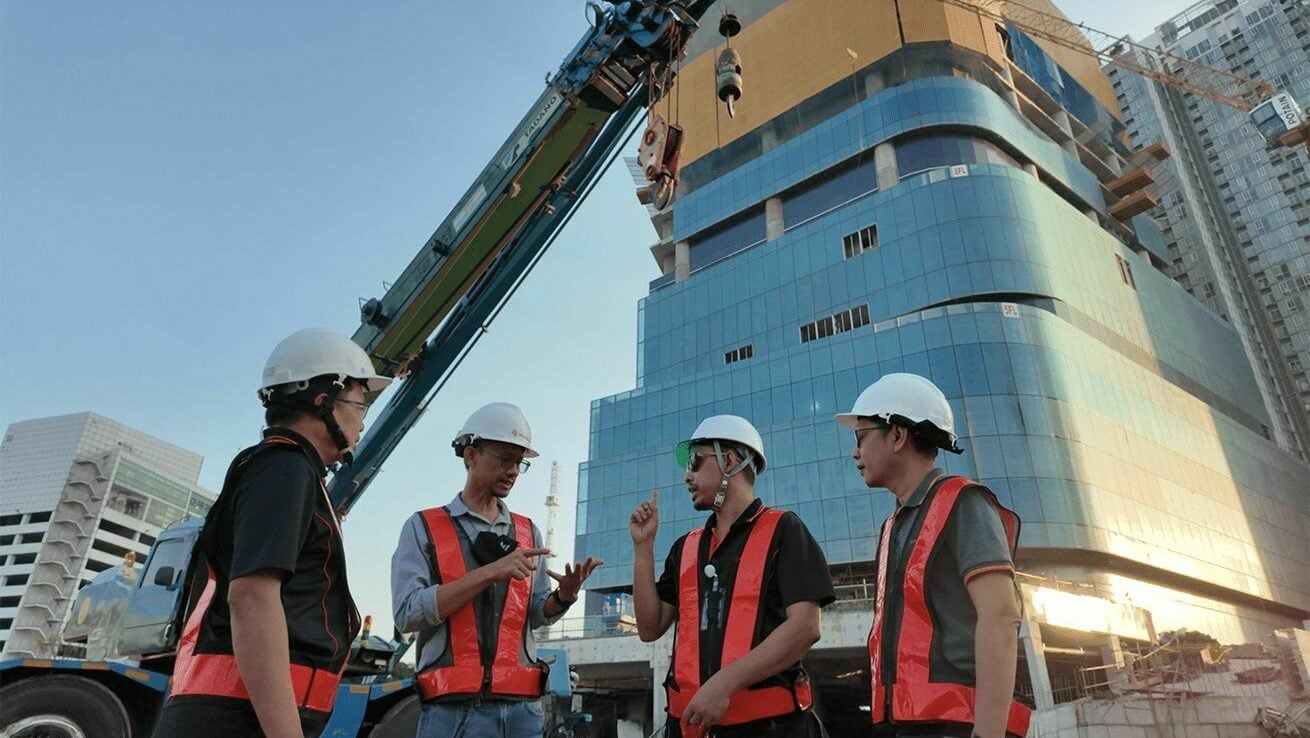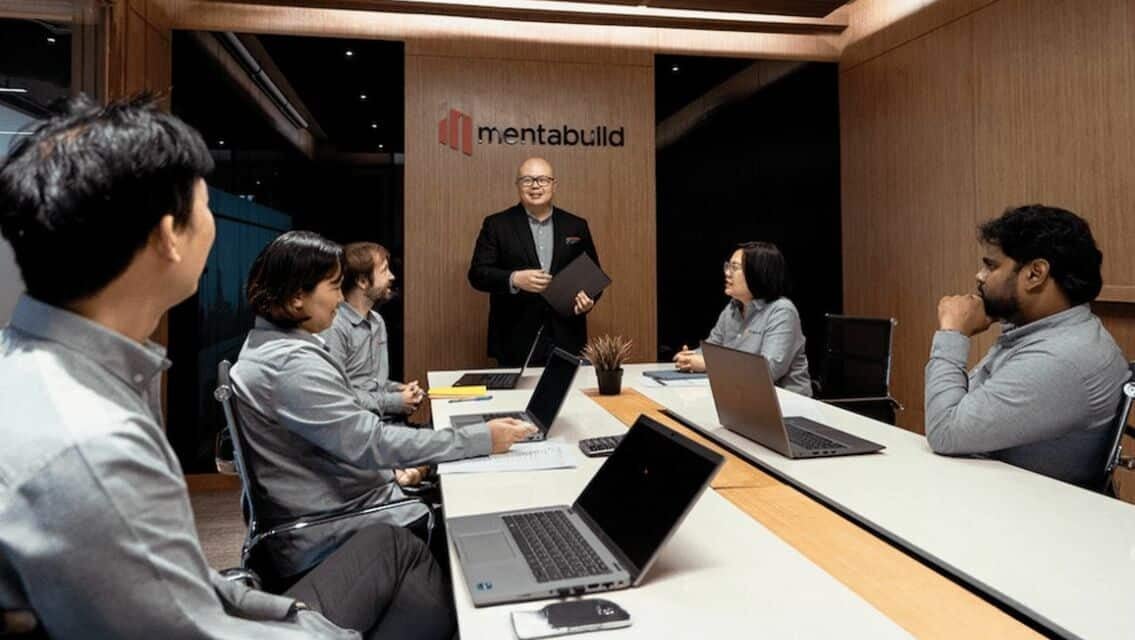

The world is full of unfinished projects. Piling and foundations laid and forgotten, condominiums frozen mid-rise, spaces that never became what they were meant to be. Anyone can dream up a skyline, but what are the real challenges? Making sure that dream doesn’t turn into a logistical horror show somewhere between the first blueprint and the final handover.
So what’s the secret sauce that turns bold ideas into functioning, finished developments? It boils down to expert project and construction management. And no one understands this better than the team at Mentabuild, the construction consultancy firm behind Thailand’s iconic developments like AIA East Gateway, The Church Of Jesus Christ Of Latter-Day Saints and BMW’s flagship office at One Bangkok.
“Project and construction management provides a structured and effective approach to managing projects from start to finish,” Mentabuild wrote on their website. But what does that really mean in an industry where cost overruns and delays are as common as steel beams and cement?
| Jump to Section | Summary |
|---|---|
| Getting it right from the start | Early-stage stress testing and alignment reduce risk and miscommunication. |
| Planning for reality | Clear roles, communication, and design reviews turn big ideas into buildable plans. |
| Budget control vs quality | Advanced project controls and predictive tools are key to realistic cost plans. |
| Keeping schedules on track | Look-ahead schedules and early warnings help avoid costly construction delays. |
| Dodging bureaucratic landmines | Planning for approvals from day one prevents stalled permits and wasted time. |
| Choosing the right people | Transparent tendering and scoring systems ensure reliable contractor performance. |
| The construction phase | Real-time monitoring and QA/QC frameworks uphold quality during execution. |
| And then, the long-term impact | Post-handover support and sustainable planning protect long-term performance. |
Getting it right from the start

Every project starts with a bold vision but without proper planning, even the best ideas can lead to serious challenges during execution.
Instead of taking a developer’s idea at face value, Mentabuild stress-tests it. This construction consultancy firm in Thailand starts by pressure-cooking ideas, asking the toughest questions early on: Is this financially viable? Does it make sense structurally? Is it worth the risk? In other words, they bake in risk management and benefit realisation strategies right from the start to maximise project value.
“We employ a structured front-end planning approach,” the team at Mentabuild told The Thaiger. “By leveraging lessons learned, benchmarking past projects and setting performance targets, we clarify the project brief so it aligns with the developer’s vision.”
A crucial part of this stage is getting all stakeholders, from architects to designers, on the same page. After all, a project is only as strong as its weakest link, and more often than not, the weakest link is miscommunication.
The developer thinks one thing, the architect another, and the contractor something else entirely. Somewhere in the confusion, the budget swells, the timeline drags, and what was once a clean and ambitious plan turns into a salvage operation.
Mentabuild’s solution to avoid miscommunication is collaborative workshops, stakeholder kick-off meetings and a tracking system early on to address every concern before it can cause chaos down the line.
“We organise workshops to align all parties on project goals and expectations. The List of Open Points (LOP) tracking system, a hallmark of Mentabuild’s process, ensures all client and stakeholder inputs are captured, tracked, and incorporated into the design, reducing abortive work, delays, and surprise culture,” they explain.
Planning for reality, not just for show

Once the dream is down on paper and goals are set, things get technical. Will the materials make sense? Can the schedule accommodate those artisanal hand-laid tiles flown in from Italy? Does it work within the budget?
This is the stage where even the boldest ideas are forced to face reality. But reality, when managed well, means structure and not compromise. And building that structure involves maintaining coordination between designers, consultants and developers.
Mentabuild streamline this coordination through their Project Execution Plan (PEP). “This includes role assignments in our ‘Responsible, Accountable, Consulted and Informed’ matrix (RACI), clear communication protocols, critical path milestones, and regular design reviews,” says the team.
Budget control vs quality
Developers want the best, but nobody wants to overpay. So, how do project and construction management keep costs in check without building something that degrades prematurely?
According to Mentabuild, the best way to do it is by utilising project benchmarking, value engineering, and detailed procurement strategies that favour long-term value over the cheapest bid.
“Our procurement strategies prioritise selecting materials, assessing technical feasibility, and incorporating operation and maintenance requirements to deliver the ‘best value for money.’”
Their Quantity Surveyor (QS) checks the numbers at every design stage, from concept and schematic to detailed design, to guarantee the budget stays realistic before anyone so much as picks up a hammer. During these checks, they factor in risks to prevent a slight miscalculation from spiralling into a financial disaster.
In addition, they use advanced project controls and predictive tools for real-time cost monitoring and forecasting. For them, having detailed cost plans and regular cost checks provides transparency and accountability. It also allows them to build financial discipline into the process from the start.
And because this construction consultancy firm brings in the operational and maintenance teams early, they avoid those oh-so-familiar post-construction headaches. The ones where, six months after opening, a high-rise suddenly needs emergency fixes because no one thought about how to maintain it properly.
Keeping schedules on track

If budget overruns are the loud killers of a project, delays are the silent ones. It starts small. An unexpected material shortage here, an overlooked approval process there. And before long, the whole timeline veers off course.
To combat this, Mentabuild uses a multi-tier programme management system (L1-L4), a scheduling method that tracks progress and anticipates potential pitfalls. They also break projects down into 4-week look-ahead schedules, which helps keep an eye on long-lead items to prevent last-minute scrambling.
“Unlike conventional consultants, we employ predictive tools to foresee potential issues and implement corrective actions proactively.”
Dodging bureaucratic landmines
For many developers, regulatory approvals are often the most painful part of the process. In Thailand, this often includes dealing with EIA (Environmental Impact Assessment) and BMA (Bangkok Metropolitan Administration) clearances.
Anyone who’s been through it knows the drill. It’s not a question of if something will slow things down, but when.
Mentabuild, however, doesn’t wait for problems to arise. Their strategy is anticipation over reaction. They factor in approvals from day one, integrating them into their project timeline rather than treating them as an afterthought. Pre-approval audits, meticulous documentation, and tight submission schedules keep projects moving while others stall out in bureaucratic limbo.
“Regulatory approvals are seamlessly integrated into our Project Execution Plan (PEP). Our local expertise means we’re familiar with processes such as EIA and BMA clearances. We engage proactively with regulatory bodies and stakeholders, addressing requirements early,” they say.
Choosing the right people to build your project
You can have the best blueprints in the world, but if you hire the wrong contractor, you’re in for disaster. Mentabuild makes sure that doesn’t happen.
“We ensure transparent tendering processes, prioritising contractor experience, technical capability, safety compliance, and cost competitiveness.”
Reliability is built into their system. Strict evaluation matrices and long-term partnerships means they only work with contractors who actually deliver, not just the ones with the best sales pitch.
Moreover, everything runs on transparency. Tenders go through structured evaluations with measurable scoring, where decisions come from data and open communication, not favours.
“Structured tendering with clear evaluation matrices creates fairness. All decisions are well-documented with tangible and measurable scoring, fostering trust among stakeholders.”
The construction phase, where it all comes together

Once the cranes go up and the concrete starts pouring, the project and construction management either prove their worth or crumble under the weight of bad decisions.
Mentabuild keeps things tight with weekly progress meetings, real-time monitoring, and a Quality Assurance/Quality Control (QA/QC) system that upholds strict standards for every brick, beam, and bolt.
“Unlike others, Mentabuild integrates QA/QC systems with performance metrics for continuous quality improvement.”
But schedules slip when no one’s watching. That’s why they rely on real-time monitoring, performance dashboards, and L4 look-ahead programmes to spot risks before they snowball, to which they added…
“We have four levels of programme monitoring processes to indicate potential delays ahead of time. Our focus on preventive measures distinguishes us from firms that act only after delays occur.”
And when is it time for the final handover? They run comprehensive Testing & Commissioning (T&C) protocols early in the project to make sure everything works as it should.
And then, the long-term impact
Most project management firms wipe their hands clean after handover. Not Mentabuild. They actively engage clients through structured feedback sessions at key project milestones and after project completion. They take notes, learn, and use those lessons to make the next project even better.
Furthermore, their closeout process is deliberate. Every detail is checked, and every issue is documented and resolved before the handover. Snagging, de-snagging, and final inspections catch any lingering flaws. Plus, thorough documentation and training sessions for operational staff create a smooth transition and set the project up for long-term success.
They’re also invested in a development’s long-term performance. “We incorporate long-term value strategies by focusing on flexible designs, sustainable materials, and energy-efficient systems,” says the team.
From integrating smart building technologies to predictive maintenance strategies, their approach keeps today’s completed project from turning into tomorrow’s costly renovations.
For more information about Mentabuild and their project and construction management services, visit mentabuild.com.
Sponsored
The story From vision to delivery: How expert project and construction management turns developer ideas into reality as seen on Thaiger News.
